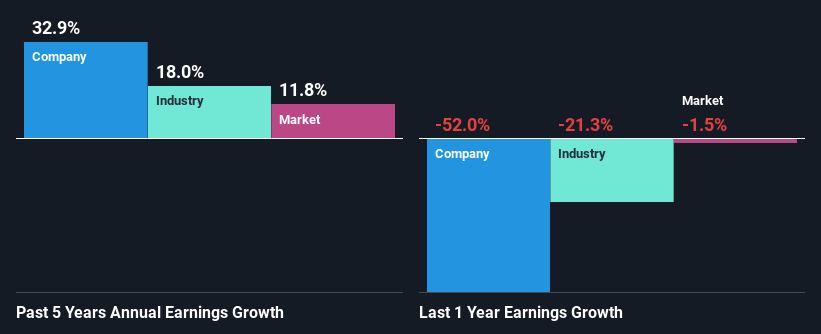Are Robust Financials Driving The Recent Rally In Capital Limited's (LON:CAPD) Stock?
Capital (LON:CAPD) has had a great run on the share market with its stock up by a significant 9.2% over the last month. Given that the market rewards strong financials in the long-term, we wonder if that is the case in this instance. In this article, we decided to focus on Capital's ROE.
Return on Equity or ROE is a test of how effectively a company is growing its value and managing investors’ money. Put another way, it reveals the company's success at turning shareholder investments into profits.
Check out our latest analysis for Capital
How Do You Calculate Return On Equity?
ROE can be calculated by using the formula:
Return on Equity = Net Profit (from continuing operations) ÷ Shareholders' Equity
So, based on the above formula, the ROE for Capital is:
12% = US$31m ÷ US$253m (Based on the trailing twelve months to June 2023).
The 'return' is the amount earned after tax over the last twelve months. So, this means that for every £1 of its shareholder's investments, the company generates a profit of £0.12.
What Is The Relationship Between ROE And Earnings Growth?
So far, we've learned that ROE is a measure of a company's profitability. We now need to evaluate how much profit the company reinvests or "retains" for future growth which then gives us an idea about the growth potential of the company. Assuming all else is equal, companies that have both a higher return on equity and higher profit retention are usually the ones that have a higher growth rate when compared to companies that don't have the same features.
Capital's Earnings Growth And 12% ROE
To begin with, Capital seems to have a respectable ROE. On comparing with the average industry ROE of 9.8% the company's ROE looks pretty remarkable. Probably as a result of this, Capital was able to see an impressive net income growth of 33% over the last five years. However, there could also be other causes behind this growth. For example, it is possible that the company's management has made some good strategic decisions, or that the company has a low payout ratio.
Next, on comparing with the industry net income growth, we found that Capital's growth is quite high when compared to the industry average growth of 18% in the same period, which is great to see.

The basis for attaching value to a company is, to a great extent, tied to its earnings growth. It’s important for an investor to know whether the market has priced in the company's expected earnings growth (or decline). Doing so will help them establish if the stock's future looks promising or ominous. Has the market priced in the future outlook for CAPD? You can find out in our latest intrinsic value infographic research report.
Is Capital Making Efficient Use Of Its Profits?
Capital's ' three-year median payout ratio is on the lower side at 12% implying that it is retaining a higher percentage (88%) of its profits. So it seems like the management is reinvesting profits heavily to grow its business and this reflects in its earnings growth number.
Moreover, Capital is determined to keep sharing its profits with shareholders which we infer from its long history of nine years of paying a dividend. Looking at the current analyst consensus data, we can see that the company's future payout ratio is expected to rise to 23% over the next three years. Despite the higher expected payout ratio, the company's ROE is not expected to change by much.
Summary
In total, we are pretty happy with Capital's performance. Particularly, we like that the company is reinvesting heavily into its business, and at a high rate of return. Unsurprisingly, this has led to an impressive earnings growth. That being so, a study of the latest analyst forecasts show that the company is expected to see a slowdown in its future earnings growth. To know more about the latest analysts predictions for the company, check out this visualization of analyst forecasts for the company.
Have feedback on this article? Concerned about the content? Get in touch with us directly. Alternatively, email editorial-team (at) simplywallst.com.
This article by Simply Wall St is general in nature. We provide commentary based on historical data and analyst forecasts only using an unbiased methodology and our articles are not intended to be financial advice. It does not constitute a recommendation to buy or sell any stock, and does not take account of your objectives, or your financial situation. We aim to bring you long-term focused analysis driven by fundamental data. Note that our analysis may not factor in the latest price-sensitive company announcements or qualitative material. Simply Wall St has no position in any stocks mentioned.
